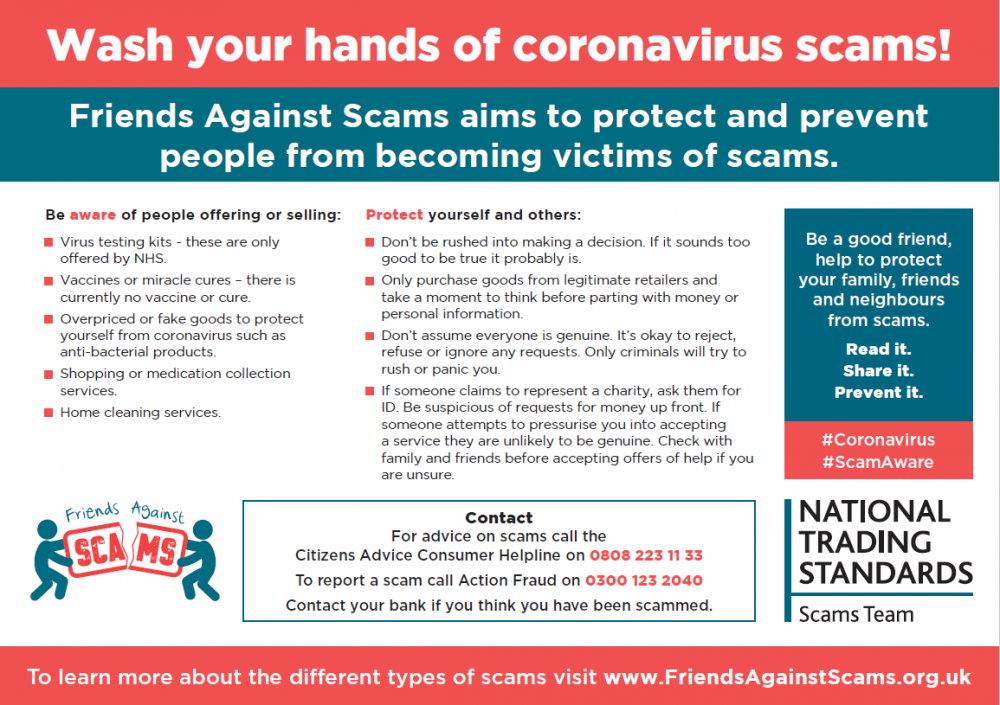Unscrupulous criminals are exploiting fears about COVID-19 to prey on members of the public, particularly older and vulnerable people who are isolated from family and friends. National Trading Standards is warning people to remain vigilant following a rise in coronavirus-related scams that seek to benefit from the public’s concern and uncertainty over COVID-19.
Members of the public should ignore scam products such as supplements and anti-virus kits that falsely claim to cure or prevent COVID-19. In some cases individuals may be pressurised on their own doorsteps to buy anti-virus kits or persuaded into purchasing products that are advertised on their social media feeds. In addition, some call centres that previously targeted UK consumers with dubious health products are now offering supplements that supposedly prevent COVID-19.
Communities are also being urged to look out for signs of neighbours being targeted by doorstep criminals. While there are genuine groups of volunteers providing help during self-isolation, there have been reports of criminals preying on residents – often older people or people living with long-term health conditions – by cold-calling at their homes and offering to go to the shops for them. The criminals often claim to represent charities to help them appear legitimate before taking the victim’s money. There are genuine charities providing support, so consumers should be vigilant and ask for ID from anyone claiming to represent a charity.
| COVID-19 scams identified include: Doorstep crime
Online scams
Refund scams
Counterfeit goods
Telephone scams
Donation scams
Loan sharks
|
Lord Toby Harris, Chair, National Trading Standards, said:
“At a time when neighbourhoods and communities are coming together to support each other, it is despicable that heartless criminals are exploiting members of the public – including some of our most vulnerable citizens – to line their own pockets. I urge everyone to be on their guard for possible COVID-19 scams and to look out for vulnerable family members, friends and neighbours who may become a target for fraudsters.
“We’re calling on communities to look out for one another. If you see anything suspicious, report it to Action Fraud or to speak to someone for advice, contact the Citizens Advice Consumer Service.”
People are being encouraged to protect their neighbours by joining Friends Against Scams, which provides free online training to empower people to take a stand against scams. To complete the online modules, visit www.friendsagainstscams.org.uk.
National Trading Standards is also issuing urgent advice to help prevent people falling victim to COVID-19 scams through its Friends Against Scams initiative:

Louise Baxter, Head of the National Trading Standards Scams Team, said:
“As people stay indoors to prevent the spread of COVID-19, criminals are preying on people in vulnerable situations who are isolated and living alone. There’s never been a more important time for neighbours to look out for each other – particularly as we self-isolate – which is why we’re encouraging communities to prevent scams in their local area by using the free Friends Against Scams resources.
“Our online courses will help you spot a potential scam, identify people at risk and help you protect local residents from falling victims to scams. We’re urging communities to protect each other from scams and encourage people to share the latest advice with families, friends and neighbours.”
Members of the public are being urged to keep in contact with family members regularly and inform them of the most prolific scams and the possible dangers to them. If you or someone you know has been a targeted by a scam you should report it to Action Fraud online at www.actionfraud.police.uk/ or by calling 0300 123 2040. For advice and information on how to check if something might be a scam, visit: www.citizensadvice.org.uk/consumer/scams/check-if-something-might-be-a-scam/.
Guy Parker, Chief Executive of the Advertising Standards Authority, said:
“We’re warning consumers to be extra vigilant about potential scam ads that appear during the coronavirus crisis. Bogus operators often use these situations to prey on people’s fears and exploit their health-related anxieties, in particular by peddling products with misleading and sometimes dangerous health claims.
“Consumers who see ads, whether online, in newspapers, social media, posters or elsewhere, that claim to offer cures or treatments for coronavirus should be highly sceptical.
“We’re working with a range of partners, including National Trading Standards and Citizens Advice, to tackle rogue businesses and providing consumers with advice to help them avoid falling victim to coronavirus related scams. We encourage anyone who sees these types of claims to pause, think and report it.”
Notes to Editors
About National Trading Standards
National Trading Standards delivers national and regional consumer protection enforcement. Its Board is made up of senior and experienced heads of local government trading standards from around England and Wales with an independent Chair. Its purpose is to protect consumers and safeguard legitimate businesses by tackling serious national and regional consumer protection issues and organised criminality and by providing a “safety net” to limit unsafe consumer goods entering the UK and protecting food supplies by ensuring the animal feed chain is safe.
About Friends Against Scams
Friends Against Scams aims to protect and prevent people from becoming victims of scams by empowering people to take a stand against scams. Anyone can join the Friends Against Scams campaign by attending a Friends Against Scams awareness session or completing the online learning. With increased knowledge and awareness, people can make scams part of everyday conversation with their family, friends and neighbours which will enable them to protect themselves and others. Other Friends Against Scams partners include Bournemouth University, Neighbourhood Watch and the Chartered Trading Standards Institute.
For more information visit: https://www.FriendsAgainstScams.org.uk/


